The Crooked Moon/Dark Bargains: Difference between revisions
mNo edit summary |
mNo edit summary |
||
| Line 150: | Line 150: | ||
* [[beyond:sources/dnd/vrgtr/dark-gifts#DarkBargains|Van Richten's Guide to Ravenloft]] offers DMs a system to grant player characters "dark gifts" via "dark bargains" | * [[beyond:sources/dnd/vrgtr/dark-gifts#DarkBargains|Van Richten's Guide to Ravenloft]] offers DMs a system to grant player characters "dark gifts" via "dark bargains" | ||
[[category: | [[category:third party content]] | ||
Revision as of 16:00, 7 August 2025
(OOC: This is an implementation of the Dark Bargains from The Crooked Moon)
Dark Bargains weave Druskenvald's essence into the characters who dare to strike them. These ancient agreements bind the land, its magical energies, its creatures.. and you. The effects bring boon and bane alike. It may be best for some sinister characters to offer their bargains plainly, letting the lurking curses reveal themselves only when the time is right. Beware your entry into these iniquitous accords.
Shake on it
Any bargain offered by an utterly unknowable, unfathomable power such as those that position themselves within the realm of Druskenvald must be carefully considered by you, your character, and the GM. These gifts are not to be offered lightly and should not be accepted lightly; their mere presence should herald significant roleplaying opportunities now and in the future.
Entering a Dark Bargain
In nearly all cases, the power that is proposing a Dark Bargain is uninterested in negotiating the duration or eventual cost of this gift. However, there may be extenuating circumstances. There could be roleplaying scenarios or simply the current events in the adventure's narrative that could cause the power to briefly—briefly!—consider negotiating. The GM has the final say on whether a given bargainer has the inclination to haggle. Generally, characters need the Dark Bargain far more than the powers need to grant it.
In any event, Dark Bargains reflect the entity imparting them, as well as the circumstances and any prices asked in exchange. You and the GM should tailor the cosmetic details of the bargain to the character's situation.
There are multiple ways a character might be tempted with power in Druskenvald.
Character Creation
With the GM's permission, you can choose a Dark Bargain when you make your character. Work with the GM to determine the circumstances of your character entering into the bargain, who offered it, and what terms your character had to fulfill—or is still expected to fulfill—to make good on the deal.
During Play
Dark Bargains can also come about during play in a campaign. There might be times where inscrutable powers have their own designs and see an opportunity for a character to further those ends in exchange for gifts. Others might be willing to negotiate a bargain as an alternative price to death or worse.
In these cases, the GM might alter terms of the bargains, such as increasing, lessening, or even waiving the prices of the bargains entirely—though perhaps only for a short time, or as long as some other condition is met.
Unique Bargains
Each Dark Bargain is unique, and a character can enter into a given bargain only once. A character could be bound to multiple Dark Bargains at one time, but each one only once.
Removing Dark Bargains
Dark Bargains are binding once sealed. There are tales and legends of those who have outwitted a bargainer or found a way to break a bargain's hold on them, but the truth of such stories is left to the GM to decide.
List of Dark Bargains
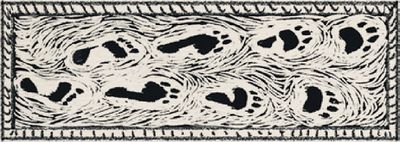
Bestial Awakening
The feral world calls to your soul, howling for you to join it. You can give in to the call and transform into a beast, but the touch of silver bites you more deeply than the sharpest fang.
- Beast Skin.
- You can cast the polymorph spell using this benefit without requiring a material component. Once you cast the spell with this benefit, you can't do so again until you finish a long rest. You can also cast it using slots you have of the appropriate level. Intelligence, Wisdom, or Charisma is your spellcasting ability for the spell when you cast it without a spell slot (choose the ability when you select this Dark Bargain).
- Searing Silver.
- Damage from silvered weapons ignores any resistance or immunity to damage you have. If you take damage from a silvered weapon or touch silver with your bare skin (or its equivalent), you can't regain hit points until you finish a short or long rest.
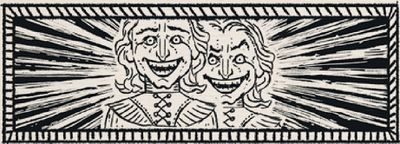
Call of the Lonely
In the depths of your solitude, and when your hope withered on the branch, you were granted a companion you can call on. You never have to be alone again. This companion is friendly toward you but is deeply unsettling to your allies.
- Never Alone.
- When no other creature can see you, you can use a bonus action to call your companion, which appears in an unoccupied space within 10 feet of you. It takes the form of a person or a vague silhouette, and it uses the doppelganger stat block. It is friendly toward you and acts as your ally, and it takes its turn on your initiative in combat. It disappears after 1 hour, when it dies, when you die, or when you use an action to politely dismiss it. When it disappears, it drops anything it was wearing or carrying.
- Once you use this bonus action, you can't use it again until you finish a long rest.
- Precocious Friend.
- The companion sometimes appears with trinkets, Cursed Curios, or other items. It might tell you where it got them, or it might not (GM's choice). If it took the object from someone who misses it or wants it back, that could create difficulties for you.
- Unsettling Presence.
- While your companion is summoned, both it and you exude a frightful air that unnerves your allies. While the companion is summoned, a creature that isn't hostile toward you that starts its turn able to see you or the companion must succeed on a DC 15 Wisdom saving throw or be frightened until the start of its next turn.
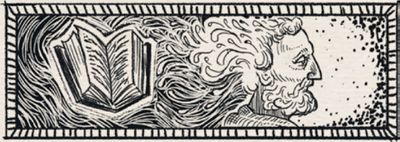
Collector of Stories
You have an insatiable desire to gather the tales of the world. Sometimes, you inadvertently take the story of meeting another person and keep it to yourself, forever.
- Gathered Tales.
- You can cast the legend lore spell with this bargain without requiring spell components. Once you cast it using this benefit, you can't do so again until you finish a long rest. You can also cast it using spell slots you have of the appropriate level. Intelligence, Wisdom, or Charisma is your spellcasting ability for the spell when you cast it without a spell slot (choose the ability when you select this Dark Bargain).
- Hoarded Stories.
- When you use this bargain to cast legend lore, a friendly NPC (the GM chooses) forgets ever meeting you. You can meet them again and attempt to rebuild a relationship, but you forever cause an unsettling discomfort in them. That NPC's attitude toward you can't ever improve beyond indifferent, and you have disadvantage on all Charisma checks against them.
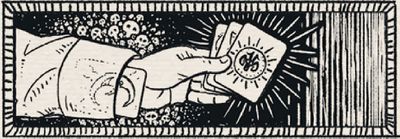
Crooked Fortune
The crooked fate that governs Druskenvald has taken a liking to you. You can avoid calamity, but you must pay back your good fortune eventually.
- Cheat Fate.
- When you fail a saving throw, you can choose to succeed instead. When you do so, if you would take half damage on a successful save, you take no damage instead. Once you use Cheat Fate, you can't use it again until you pay the price (see below).
- Delayed Price.
- After you use Cheat Fate, your next three saving throws have disadvantage and can't have advantage, and you gain 1 level of exhaustion when you succeed on one of the saves. Once you succeed or fail on the third saving throw, you regain the use of Cheat Fate. The powers that govern the warp and weft of fate don't take kindly to cheating outside their terms—at the GM's discretion, saving throws made intentionally or without true consequences simply to pay this price painlessly don't count.
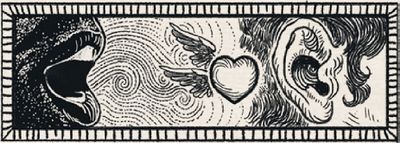
Cult of Personality
You are a force of charm and allure with which to be reckoned. While others fall over themselves to stumble into your good graces, you might find that you end up needing them more than they need you.
- Honeyed Words.
- As an action, you can speak sweet words to a creature within 60 feet of you. The creature is charmed by you for 24 hours, until you use this feature again, or until you or your allies deal any damage to the target or force it to make a saving throw. The charmed target is your ally and follows your commands as long as they don't require the target to harm itself. If the target carries out a command it finds odious, it makes a DC 15 Wisdom saving throw, ending the condition on itself on a success. Once the condition ends, the target is immune to this feature for 24 hours.
- If the target has immunity to being charmed, it instead has disadvantage on ability checks, attack rolls, and saving throws until the start of your next turn, and you gain a number of temporary hit points equal to your level. Once you use this feature, you can't use it again until you finish a short or long rest.
- Solitary Weakness.
- If you start your turn with no allies that you can see or hear within 20 feet of you, you lose any temporary hit points you have from any source, and you have disadvantage on ability checks, attack rolls, and saving throws until the start of your next turn.
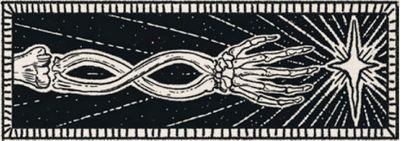
Hand of Death
Death has no claim on you. In exchange for staying its cold hand without that hand closing, you become a maw through which death feeds on the world around you. Adamant Endurance. You have advantage on Constitution saving throws.
- Cling to Life.
- When you have 0 hit points at the start of your turn, or when you die, you can instead choose to regain a number of hit points equal to half your hit point maximum. Once you use this feature, you can't use it again. After using it, whenever you regain hit points through any means, you gain only half that amount. Once a Humanoid (other than you) dies within 30 feet of you, you regain the use of this feature, and you can regain hit points as normal.
- Death Knell.
- Other creatures within 10 feet of you have disadvantage on death saving throws, and you can't restore hit points to a creature with 0 hit points by any means.
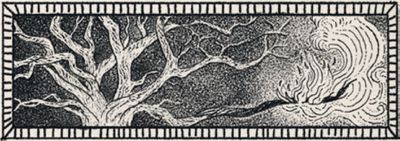
Might of the Old
Ancient and primeval power dwells within the oldest forests of Druskenvald. These powers pour their strength into you but can overwhelm you with their unchanging nature.
- Ancient Might.
- Your Strength score increases by 2, to a maximum of 22, and your Dexterity score decreases by 2.
- Primeval Strength.
- As a bonus action, you can call upon the might of the ancients to raise your Strength score to 25 for 1 minute, during which time you deal double damage to objects. Once you use this bonus action, you can't use it again until you finish a long rest.
- Pyre's Price.
- When you activate Primeval Strength, your skin takes on a bark-like texture, during which time you have vulnerability to fire damage. Your skin returns to normal when you finish a long rest.
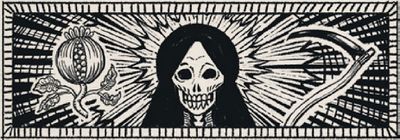
Self-Serving Sacrifice
You can snatch others from the jaws of death, but your own grip lingers too tightly. The feeling of saving others from suffering fills you with resolve, even as it drains the vigor from those you rescue.
- Critical Savior.
- When a creature within 120 feet of you is subjected to a critical hit or is reduced to 0 hit points, you can use your reaction to magically switch places with the target. Each of you teleports to the other's space. Roll a number of d6s equal to half your level. You take force damage equal to the total rolled, you gain inspiration, and your exhaustion level is reduced by 1. The target regains hit points equal to the total rolled and gains 1 level of exhaustion. You can't use this feature again until you finish a short or long rest.
- Draining Presence.
- When you finish a short or long rest, each creature within 100 feet of you loses one Hit Die (before spending Hit Dice in the case of finishing a short rest).
- Final Sacrifice.
- You can cast the True Resurrection spell using this bargain requiring no material components. Intelligence, Wisdom, or Charisma is your spellcasting ability for the spell when you cast it without a spell slot (choose the ability when you select this Dark Bargain).
- When you cast the spell this way, you die, and nothing can prevent it. Your soul is bound to torment the creature you returned to life, and you can't be raised from the dead by any means. When the creature takes a long rest, it must roll a d20 halfway through the rest's duration. On a 1, your soul takes the form of a wraith within 100 feet of the creature and tries to kill it. The wraith vanishes after 8 hours, or when it dies. Once the wraith appears, it can't appear again for 30 days.
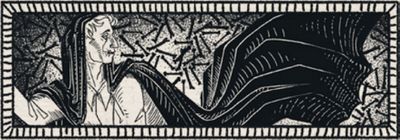
Shrouded Spirit
The pall of death drapes over you like the Shroud of Druskenvald. This shroud protects you from the depredations of the Undead, but it draws you ever nearer to their cold embrace.
- Inured to Undeath.
- You have resistance to necrotic damage, and you have advantage on saving throws against spells and effects created by Undead.
- Unholy Appetite.
- You must consume one pound of raw flesh (it needn't be fresh) per day. If you don't, at the day's end, you must succeed on a DC 10 Constitution saving throw or gain 1 level of exhaustion.
- Withering Soul.
- Features that detect your creature type, such as a paladin's Divine Sense or the Detect Evil and Good spell, treat you as Undead if your creature type isn't Undead already.

Skin of Coffin Nails
Your body becomes as coldly unrelenting as iron nails sealing away the dead. You can shrug off staggering punishment, but the waters of the world no longer embrace you, as if spiting your defiance.
- Iron Grit.
- You gain resistance to bludgeoning, piercing, or slashing damage (your choice when you select this Dark Bargain). You can change the damage type to one of the other options when you finish a short or long rest. When you suffer a critical hit from the chosen damage type, it becomes a normal hit instead.
- Watery Doom.
- When you are immersed in water or splashed with at least 1 gallon of water (such as from a bucket or being rained on), your skin tightens and grows rusty until you finish a short or long rest. During that time, your speed and the time you can hold your breath are halved, and your resistance to the chosen damage type for Iron Grit becomes vulnerability instead. At the GM's discretion, other liquids can also trigger this feature.
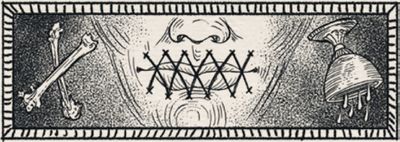
Stilled Hungers
Food, drink, and maladies of the flesh have lost their hold over you, but these are the very things that keep a soul vital while in the land of the living. Your mind grows ravenous absent those urges—your thoughts crack with gnawing fears, and your dreams wither into crooked nightmares.
- Sated Cravings.
- Forgoing food and drink doesn't give you levels of exhaustion. You have resistance to poison damage, and you have advantage on saving throws to avoid or end the poisoned condition.
- Tenuous Psyche.
- You have vulnerability to psychic damage and disadvantage on saving throws to avoid or end the frightened condition. A calm emotions spell cast on you suppresses this feature for its duration.
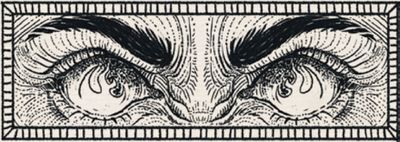
Unquenchable Fury
Anger is a powerful tool. This bargain stokes it into a formidable inferno, but it threatens to consume everything in its path.
- Furious Onslaught.
- As a bonus action, or when you take the Attack action on your turn, you can choose to enter a fury. While in this fury, you can make one additional melee attack when you take the Attack action on your turn, and you reduce all damage you take by an amount equal to your proficiency bonus. The fury ends if you are incapacitated, if you die, or if you end your turn and there are no creatures within 60 feet of you that you can see or hear. Once you use this feature, you can't use it again until you finish a long rest. You also regain the use of this feature when you kill a Humanoid.
- Red Haze.
- While you are in a fury, you must make a DC 15 Wisdom saving throw at the start of each of your turns. On a successful save, you can choose to end your fury or continue it. On a failed save, you no longer make the saving throw at the start of your turns, and you regard the creature nearest to you that you can see or hear as your enemy (if there are multiple, choose one at random). On each of your turns, you must move as close to the creature as possible and take the Attack action, targeting that creature with melee attacks. If you're unable to get close enough to the creature to attack it, your turn ends after you've used up all your available movement. If the creature dies or can no longer be seen or heard by you, the next nearest creature that you can see or hear becomes your new target.

Wings of Whispers
You have been gifted with secrets that you can call upon in the form of ravens and crows to bear you aloft, but at the risk of revealing your own secrets in turn.
- Murderous Flight.
- As a bonus action, you can magically gain a flying speed equal to your walking speed (and you can hover) for 10 minutes. During this time, a mass of shadows takes the shape of a murder of crows and ravens (but they aren't truly creatures). The birds fill the area within 20 feet of you and take flight and whirl around you when you fly. Once you use this feature, you can't do so again until you finish a short or long rest, unless you gain 1 level of exhaustion to use it again early.
- Whispered Secrets.
- The birds that appear when you activate Murderous Flight remain and continue to follow you until you finish a short or long rest. While the birds are present, you have disadvantage on Dexterity (Stealth
 Dexterity (Stealth)skillMake a Dexterity (Stealth) check when you attempt to conceal yourself from enemies, slink past guards, slip away without being noticed, or sneak up on someone without being seen or heard.) checks, and the birds whisper your secrets into the minds of other creatures, granting them advantage on Wisdom (Insight
Dexterity (Stealth)skillMake a Dexterity (Stealth) check when you attempt to conceal yourself from enemies, slink past guards, slip away without being noticed, or sneak up on someone without being seen or heard.) checks, and the birds whisper your secrets into the minds of other creatures, granting them advantage on Wisdom (Insight Wisdom (Insight)skillYour Wisdom (Insight) check decides whether you can determine the true intentions of a creature, such as when searching out a lie or predicting someone’s next move. Doing so involves gleaning clues from body language, speech habits, and changes in mannerisms. or Perception
Wisdom (Insight)skillYour Wisdom (Insight) check decides whether you can determine the true intentions of a creature, such as when searching out a lie or predicting someone’s next move. Doing so involves gleaning clues from body language, speech habits, and changes in mannerisms. or Perception Wisdom (Perception)skillYour Wisdom (Perception) check lets you spot, hear, or otherwise detect the presence of something. It measures your general awareness of your surroundings and the keenness of your senses. For example, you might try to hear a conversation through a closed door, eavesdrop under an open window, or hear monsters moving stealthily in the forest. Or you might try to spot things that are obscured or easy to miss, whether they are orcs lying in ambush on a road, thugs hiding in the shadows of an alley, or candlelight under a closed secret door.) checks made against you.
Wisdom (Perception)skillYour Wisdom (Perception) check lets you spot, hear, or otherwise detect the presence of something. It measures your general awareness of your surroundings and the keenness of your senses. For example, you might try to hear a conversation through a closed door, eavesdrop under an open window, or hear monsters moving stealthily in the forest. Or you might try to spot things that are obscured or easy to miss, whether they are orcs lying in ambush on a road, thugs hiding in the shadows of an alley, or candlelight under a closed secret door.) checks made against you.
See Also
- Curse of Strahd has a number of "dark gifts" which can be obtained during the adventure.
- Van Richten's Guide to Ravenloft offers DMs a system to grant player characters "dark gifts" via "dark bargains"

